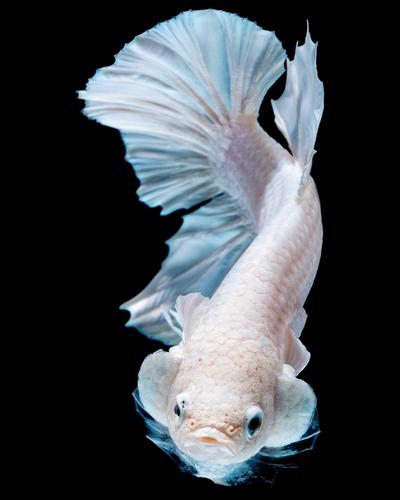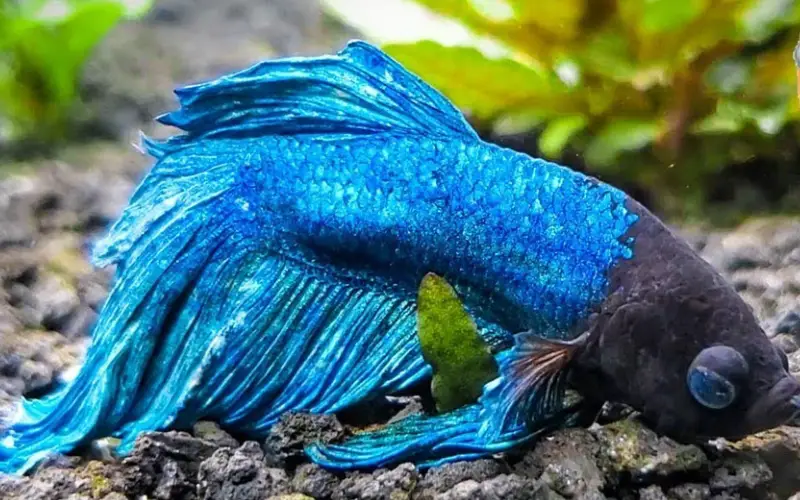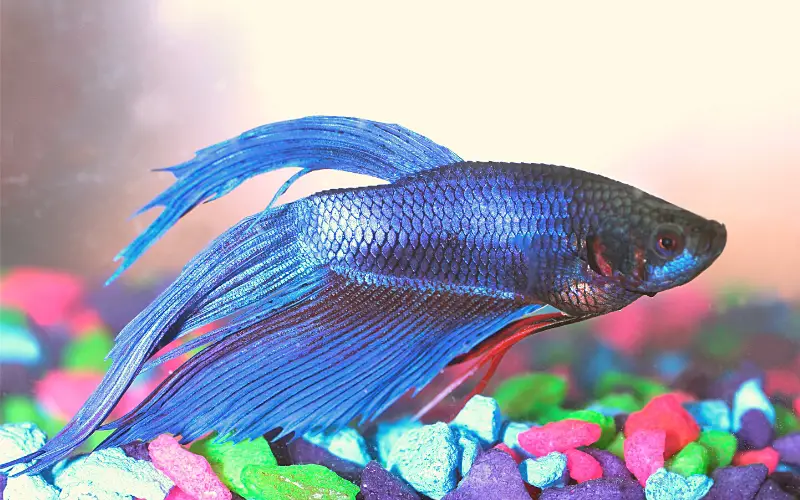Are you a betta owner worrying about whether your fish is reaching the end of its natural life span? Many betta fish owners don’t know how to tell if a betta fish is dying of old age.
It can be challenging to tell when your betta has passed away from natural causes without knowing the signs of old age in betta fish.
If so, it’s essential to recognize when a betta is nearing sudden death from old age and help make decisions accordingly.
This article will teach you how to look for old betta fish behavior before death and the common signs of an aging betta fish death so that you can provide it with a peaceful and comfortable death.

This blog post provides seven clear signs that can help identify if your betta dying of old age, plus some additional tips on the best care for an aged betta. Read on to learn more!
Table of Contents
ToggleWhy Is My Betta Fish Dying?
is my betta dying? Bettas can be vulnerable to less than optimal living conditions, from poor water and temperature extremes to inadequate nutrition.
But the physical harm is only half of it—constant stress weakens their immune system, raising their risk for deadly diseases.
As your betta ages, its health will naturally deteriorate, and its ability to fight diseases decreases. With poor care, those diseases can take their toll more quickly.

Aging bettas, like all fish, can be susceptible to bacterial infections due to weakening immune systems. Betta owners must not overlook such health issues so these beloved pets can continue swimming happily for years!
Fish TB may not have the same symptoms as human tuberculosis, but it can still be just as infectious.
It’s a zoonotic disease that can be passed from infected fish to humans – so make sure you practice proper hygiene when dealing with your aquatic pets!
In any case, it’s crucial to constantly check the general health of your betta fish so that you can act quickly if necessary.
Can Fish Die of Old Age?
Can fish die from old age? Yes, fish can die of old age. Like many other living organisms, fish have a natural lifespan, and as they age, their bodies undergo various physiological changes that can eventually lead to death.
However, the lifespan of fish varies greatly depending on the species. Some fish species have relatively short lifespans, while others can live for several decades or even longer.
Factors such as genetics, environmental conditions, and availability of food can also influence the beta fish lifespan.
Signs Your Betta is Getting Old
How to tell if your betta fish is dying? Here are some signs your betta fish might be getting older: signs your betta fish is dying
- Reduced Activity: Older bettas may become less energetic, swimming less and spending more time resting on the bottom or near the surface.
- Color Fading: Their vibrant colors may dull or fade over time, with once-bright hues becoming paler.
- Fin Wear: betta fins shredded overnight, appearing frayed or torn at the edges.
- Loss of Appetite: Older bettas may eat less or lose interest in food.
Young vs Old Betta Fish
When comparing young and old betta fish, several key differences come into play regarding their appearance, behavior, care requirements, and health. Here’s a detailed look at these differences:
Appearance
- Young Betta Fish: Juvenile bettas are generally smaller, often around 1-2 inches in length. Their colors may not be fully developed, and their fins may appear shorter and less impressive. They can also show more of a faded or muted color compared to adults.
- Old Betta Fish: Adult bettas can grow up to 3 inches or more, with fully developed, vibrant colors and long, flowing fins. The patterns and hues become more pronounced and can be a mix of stunning colors depending on the strain.
Behavior
- Young Betta Fish: Juvenile bettas are typically more active and curious. They may display playful behavior, darting around their environment. However, they might be more shy and less territorial compared to adults.
- Old Betta Fish: Adult bettas can exhibit territorial behavior, especially males, who may become aggressive if they feel their space is invaded. They may also show more defined behaviors, such as flaring their fins in response to perceived threats.
Care Requirements
- Young Betta Fish: Juveniles need slightly different care than adults, including a smaller tank size (around 5 gallons) and a diet rich in protein, such as specialized betta pellets or live/frozen food. They require a stable water temperature and regular water changes to thrive.
- Old Betta Fish: Adult bettas usually thrive in a tank of at least 5 gallons but prefer 10 gallons or more. They require more robust filtration and larger water changes. Their diet should still focus on high-quality pellets and occasional treats to maintain health.
Health
- Young Betta Fish: Being young, they may be more susceptible to stress and disease, particularly if not acclimatized properly to their environment. Regular monitoring is essential to prevent illness.
- Old Betta Fish: Older bettas might face age-related health issues, such as fin rot or other diseases due to weakened immune systems. Regular health checks and prompt treatment are crucial to maintaining their well-being.
How to Tell If Betta Is Dying of Old Age?
How to tell if a fish is dying of old age can be difficult because the signs your betta is dying are often subtle and hard to recognize.
However, there are some telltale signs that your betta fish dying of old age to look for. Remember that these betta fish old age symptoms may vary slightly depending on the type of betta fish.
7 Signs That Your Betta Is Dying (Symptoms of Betta Fish Old Age)
Here are the major betta old age symptoms:
Lethargy
one of the signs your betta fish dying of old age, If they lacks the energy it once had, this could be a sign that its old beta fish age is catching up with it. Dying betta fish may swim slower, spend more time resting at the bottom of the tank and not actively seek out food.
Loss of Appetite
An elderly betta will have less appetite than usual, even for their favorite snacks or treats. They may also become pickier about what they eat as they age.
Reduced Color Vibrancy
Another betta old age symptoms, As bettas approach death due to declining years, their colors may fade or become duller than usual. This can be especially noticeable in brightly colored fish like reds and blues whose multi-hued scales have dimmed to a single hue.
Lumps and Bumps on the Body
As fighter fish age, they may develop bumps or lumps on their body. These are usually signs of cancer or other illnesses, so keeping an eye out for unusual growth is essential.
Cloudy Eyes
If your betta’s eyes seem milky or cloudy, this could be a sign that its vision is failing due to elderly age. It may also have trouble swimming in straight lines as its vision worsens.
Labored Breathing
Betta fish breathe through their gills, so if you notice your betta is having difficulty breathing, it might be time to prepare for the end. Frequent gasping or gulping at the surface of the water can indicate it is in respiratory distress.
Difficulty Swimming
Arthritis and other age-related conditions often make swimming difficult for older betta fish, so if your fish seems to have trouble moving its fins or staying upright, this could be a terrible sign that aging has taken its toll.
Whether you’ve had your betta for years or just recently adopted one, it’s essential to be aware of these dying old betta fish signs when trying to determine whether a sick betta is dying due to old age.
By recognizing these warning signs early on, you can provide it with extra care, support during its last days, and peace of mind that it won’t suffer needlessly.
What Does a Betta Fish Look Like When It’s Dying?
What Does a Dying Betta Look Like? Betta fish symbolize beauty and strength and are delicate creatures who may slowly slip away when they display strange behaviors such as fading color tones, a sluggish attitude towards life or its surroundings, and quick breathing cycles accompanied by agitation.
These telltale betta fish dying symptoms can indicate that your beloved pet might not have much time left – so monitor their activity closely to ensure they live in health and harmony!
What Does Old Age Look Like in a Betta?
Old age in a betta may be subtle, but some telltale signs can help you identify your aging sick fish.
The most common sign is a fading of their vibrant coloration, usually accompanied by dulling eyes and thinning fins. Bettas may also become less active and have difficulty swimming.
You may also notice growths on their bodies or changes to their physical appearance, such as a hunchback.
Finally, your betta may struggle to eat or become more sensitive to changes in water temperature. If you notice any of these signs, it might be time to give your betta extra care and attention, as its days may be numbered.
Young Vs. Old Betta Fish
- Young betta fish are typically much more active and display a wide range of vibrant colors, while older bettas may be less active and have duller coloration.
- Also, healthy betta tends to swim in larger circles or figure eights around their tank, whereas older fish will tend to keep close to the bottom of the tank and swim in shorter, more direct paths.
- Young bettas will also typically have longer fins and be able to stay afloat for extended periods, whereas older fish may struggle to keep up the same level of activity.
- Finally, younger fish tend to eat more readily than their older counterparts, which may display a decrease in appetite.
When distinguishing between young and old betta fish, these physical features can be a helpful guide!
Is My Betta Sick or Just Old?
As time passes, even our beloved bettas may succumb to the effects of aging; however, if you notice a sudden drop in your fish’s energy levels or fading color over days and weeks, this could indicate something more serious is going on.
If no improvements come from self-care measures, it’s best to take extra precautions by consulting with a professional for further advice.
Is 4 Years Old for a Betta Fish?
4-year-old betta fish are considered to be elderly and may display signs of aging betta fish such as a decrease in activity, dulling colors, and thinning fins.
At this age, your betta may also have difficulty swimming or eating and require extra care and attention from you.
It is essential to monitor them closely for any signs of distress and provide them with a comfortable, clean environment to live out their days.
Signs Your Betta Is Stressed
In addition to old age, bettas can also experience stress from various environmental factors. If your sick fish is displaying any of the common old betta fish behaviors, this could indicate that they are feeling stressed:
- Rapid breathing, darting around the tank and flashing out
- Refusing to eat
- Lethargy or loss of appetite
- Clamped fins and a pale body color
If your betta is displaying any of these signs, it’s essential to take immediate action to ensure its health and well-being.
Check the water parameters and temperature, provide a safe environment with plenty of hiding places and live plants, and keep an eye out for any changes in behavior.
Avoid housing your betta with aggressive tank mates, and ensure a regular diet of quality food.
Betta Fish Behavior Before Death
How to tell if a betta is dying? As your betta nears the end of its life, you may notice a decrease in activity, dulling coloration, and thinning fins. Your betta may also become less active and have difficulty swimming or eating.
Finally, it is common for dying betta fish to develop growths on their bodies or start to display a hunchback before they pass away.

If you notice these betta fish behavior before death, providing extra care and attention is essential as its days may be numbered.
How Do You Know When a Betta Fish Is About to Die?
How do you know if betta is dying? When a betta is near death, it will become increasingly lethargic and unresponsive to its environment.
The fish may also start to display a hunchback, have difficulty swimming and eating, or develop growths on its body.
Do Betta Fish Lose Their Color When They Die?
Yes, betta fish may lose their color when they die due to the lack of oxygen and nutrition in their system. This can cause them to become pale and their fins to become thin and fragile. Their scales may sometimes even fall off as the fish passes away.
It is essential to watch for any signs of distress indicating a betta is nearing death and provide them with the best possible care and environment throughout their life.
This can help your betta fish live a long and healthy betta fish lifespan!
How Do I Know If My Betta Fish Is Suffering?
how do i know if my betta fish is dying? Your betta’s health can be easily seen in its activity level. If it isn’t acting like the energetic fish you know and love, something may be wrong!
When a betta feels unwell, it’s usually quite apparent – you’ll notice his energy levels drop, and he may appear sluggish or slow.
He might even take to the depths of the tank for some peace away from prying eyes!
Is My Betta Resting or Dying?
If your betta isn’t taking any breaths, it may be time to worry – after all, a fish out of water is no fun! Pay close attention to its mouth and gills; even when sleeping, you should still see the movement associated with breathing.
Keep an eye on your underwater friend’s activity level so they can continue living their best aquatic life!
Can Fish Get Dropsy from Old Age?
Old betta with dropsy can happen due to old age, poor water conditions, and a weakened immune system. Dropsy is an advanced form of dropsy where the scales on the fish’s body become swollen with fluid.
It is essential to monitor your betta fish closely and provide it with adequate care and clean habitat to prevent dropsy from occurring.
If you suspect your betta is suffering from dropsy due to old age, it is vital to seek medical attention from your local fish vet.
This way, you can ensure that your betta gets the best care possible.
It is important to remember that a betta’s life is finite, and its health can decline due to age or illness.
Why Is My Betta Fish Struggling to Breathe?
Betta fish looks dead, but frequent breathing can be caused by many different factors, such as water temperature that is too low or high, poor water quality, physical injury, or disease.
Recognizing the signs of a betta fish in distress is vital – if you think your betta is struggling to breathe, it is essential to act quickly and investigate the cause as soon as possible.
It is also a good idea to adjust your betta’s environment to ensure it gets the proper care it needs. This can include changing the water temperature or testing the water for ammonia, nitrite, and nitrate levels.
How to Keep My Betta Fish from Dying?
Bettas are beautiful fish, but they can be hard to keep alive. Most people think bettas are easy to care for and only need a small tank with a bit of water. This is not true! Betta fish die easily if their environment could be better.
Watch this video and learn how to keep your betta healthy and happy. You will learn about the best tank size, what kind of water to use, how often to change the water, and what food your healthy betta should eat.
FAQs ABOUT how to know if betta fish is dying
What signs are there of old age betta fish?
Some signs of old betta fish, are Less active, faded color, and ragged fins are all signs your betta might be getting older. Their appetite may also decrease. These are normal, but consult a vet if you see signs of illness.
What does an old betta fish look like?
what do old betta fish look like? An old betta fish may have faded colors, a slightly hunched back, and slower movements. Their fins might be torn or tattered, and their scales can appear dull or cloudy.
What can i do if my old betta fish dying?
what to do when betta fish is dying? It’s heartbreaking to see your beloved betta nearing the end. Provide a quiet, comfortable environment with clean water and minimal stress. Offer small, high-quality food and observe for any signs of discomfort. Sadly, there’s no cure for old age, so focus on making their final days peaceful.
How long do betta fish sleep?
How many hours do betta fish sleep? Betta fish sleep for varying amounts, but typically take short naps throughout the day and rest more during night cycles.
How to tell if your fish is dying betta?
How do i know my betta is dying? Listlessness, clamped fins, or labored breathing can signal your betta is sick. Watch for fading color, floating or sinking strangely, or loss of appetite.
What is the average lifespan of a betta fish?
With good care, betta fish can live 2-5 years. Pet store bettas may be older already, so focus on creating a healthy environment for them to thrive.
how to tell how old a fish is?
Counting growth rings on fish scales or ear bones (otoliths) is the common way to estimate a fish’s age. It requires a microscope and is usually done by scientists.
Why is my betta fish not eating?
Bettas may refuse food due to stress, tank issues, or illness. Check water quality, temperature, and try a varied diet like flakes or bloodworms.
How old are betta fish when you buy them?
Betta fish at pet stores can be 6 months to 1 year old. Males are usually older for vibrant colors. Aim for a healthy, young fish!
How to know age of betta fish?
Unfortunately, pinpointing a betta’s age is tricky. Look for clues like size (younger bettas are smaller), vibrant color (fades with age), and fin condition (tears suggest an older fish).
How to tell if a betta is old?
Look for decreased swimming, duller colors, and a hunched back as signs your betta might be getting old. Appetite loss is also common. These are normal, but rule out illness with a vet if concerned.
How do i know when my betta fish is dying?
How to know if your betta fish is dying? Signs of a dying Betta fish include lethargy, loss of appetite, faded colors, clamped fins, gasping for air, and unusual behavior. how to tell if your betta is dying? If you observe these betta old age symptoms, it’s crucial to address water quality, temperature, and consult a veterinarian for proper diagnosis and treatment.
Why did my betta fish suddenly die?
Why do betta fish die suddenly? Betta deaths can be due to poor water quality, improper temperature, stress, or illness. Consider recent tank changes or tankmate issues.
Do betta fish lose their fins?
Betta fish shouldn’t lose fins naturally. Ragged or disappearing fins likely indicate fin rot (infection) or fin nipping (stress).
How long do betta fish live for?
Betta fish typically live for 2 to 5 years, depending on care, water quality, and diet. Proper tank conditions can help extend their lifespan.
How to tell if your betta fish is unhappy?
Signs of an unhappy betta fish pale and lethargic, faded colors, fin clamping, loss of appetite, and hiding. Ensure proper water conditions and stimulation to improve their well-being.
How often to feed a betta fish?
Feed a betta fish 2 to 3 small meals per day, avoiding overfeeding. Use high-quality pellets and occasionally supplement with live or frozen foods for variety.
Can i feed my betta once a day?
Yes, you can feed your betta once a day, but splitting meals into two smaller feedings is better for digestion and helps prevent overfeeding.
Can betta fish have cataracts?
Yes, betta fish can develop cataracts due to aging, poor water quality, or genetic factors. Maintain clean water and a balanced diet to reduce the risk of betta cataracts.
What Cause betta fish pectoral fin problems?
Betta fish pectoral fin problems can be caused by injury, poor water quality, fin rot, or diseases. Regular tank maintenance and prompt treatment can help prevent these issues.
How can you tell if your betta fish is dying?
How do i know if my betta is dying? Signs that a betta fish may be dying include lethargy, fading colors, difficulty swimming, lack of appetite, and unusual behavior. Monitor closely and check water conditions for issues.
How to tell if betta fish is dead?
How do you know if your betta fish is dead? To determine if a betta fish is dead, check for a lack of movement, unresponsiveness to touch, floating belly-up, and cloudy or dull eyes. Remove it promptly if confirmed.
Conclusion
So, how to tell if a betta fish is dying of old age? As your betta ages, you might notice changes in its appearance and behavior. While it’s normal for them to slow down and become less active as they age, some old betta fish signs indicate they may die of old age. If your betta losing color and laying on bottom of tank, has lost interest in food, or seems to be sleeping a lot, these could be signs betta fish is dying. If you need clarification on whether your betta is just getting old or dying, it’s always best to consult a veterinarian who can help you determine. Knowing how to tell if betta dying of old age can help you provide them with the best possible betta fish care during their final days.
You might also like
- How Long Do Betta Fish Live? (10 Tips for A Healthy Betta)
- 5 Reasons Why Do Betta Fish Play Dead: (Uncovered & Solved)
- Can a Betta Fish Eat Goldfish Food! (Or Will It Be Harmful?)
- How to Tell If Betta Is Stressed? (10 Signs of Happy Betta)
- Why Did My Betta Fish Die Suddenly? Top 9 Reasons (Revealed)
- Do Betta Fish Float When They Die? Top 5 Reasons Bettas Die!
- Betta Fish Laying on Bottom of Tank and Not Eating: 3 Reasons Solved
- Is My Betta Fish Sleeping or Dead: (7 Signs to Look Out For)




